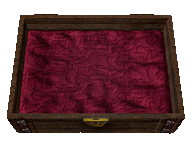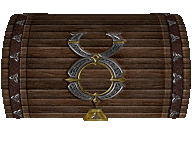Difference between revisions of "Corrosion"
EvilManfred (talk | contribs) |
EvilManfred (talk | contribs) |
||
| Line 264: | Line 264: | ||
Note that the hue of your weapon will not change. | Note that the hue of your weapon will not change. | ||
=Siege Perilous= | |||
On Siege Perilous, the following changes have been made to the [[Poisoning]] skill and the Corrosion system: | |||
* Weapons can be poisoned as normal - Use the poisoning skill, target the poison potion and finally target the weapon. On every successful hit you have a chance to inflict poison on your opponent. | |||
* The chance to inflict poison now depends on the poisoning skill of the player who poisoned the weapon. This chance is roughly "Poisoning skill / 4". A GM poisoned weapon should therefore poison 25% of all hits. Note: Poison hits are "predictably random" rather than fully random. | |||
* As always, every time you hit with a poisoned weapon, whether it inflicts poisons or not, one poison charge is consumed. | |||
* When you poison your opponent, your weapon will be afflicted with the "corrosion" effect. Your weapon breaks much quicker when it is corroding. | |||
* You can identify corrosion by using arms lore on the weapon. | |||
* You can remove corrosion by cleaning your weapon with an oil cloth. Note: Using oil cloth on your weapon will also remove any remaining poison charges. | |||
* Oil cloth now has a limited number of uses. | |||
Revision as of 20:14, 3 May 2023


Damage occurs whenever your weapon comes into contact with corrosive substances. Whether it's from striking acidic slimes and elementals or blood mixing in with poison, corrosion damage will chew away at your weapons durability until there is nothing left.
There are methods for avoiding corrosion in both wooden weapons and those made from metal.
Soft Metals
Certain metals are considered to be soft and are well known for their ability to resist corrosion damage. They include:
- Dull Copper
- Copper
- Bronze
- Gold
Weapons crafted using these materials will resist 100% of corrosion from substances of all kinds.
Note that weapons crafted from these metals can be used by Zora in the creation of slayer and super-slayer weaponry.
Wax
All wooden weapons can be sealed with wax to prevent corrosion. Sealed weapons will resist 100% of corrosion damage, either from contact with acidic creatures or poison mixing with blood.
Wax Pots are available on the beekeeper for 60 gp. You’ll need 4 beeswax and the Cooking skill to provide a weapon with 20 coats of wax.
Under Ingredients in the Cooking menu, you will select Melted Wax. Your empty pot will be filled with wax.
Next, double click the pot to apply the wax (20 coats at a time) to the wooden weapon of your choice.
Note that the hue of your weapon will not change.
Siege Perilous
On Siege Perilous, the following changes have been made to the Poisoning skill and the Corrosion system:
- Weapons can be poisoned as normal - Use the poisoning skill, target the poison potion and finally target the weapon. On every successful hit you have a chance to inflict poison on your opponent.
- The chance to inflict poison now depends on the poisoning skill of the player who poisoned the weapon. This chance is roughly "Poisoning skill / 4". A GM poisoned weapon should therefore poison 25% of all hits. Note: Poison hits are "predictably random" rather than fully random.
- As always, every time you hit with a poisoned weapon, whether it inflicts poisons or not, one poison charge is consumed.
- When you poison your opponent, your weapon will be afflicted with the "corrosion" effect. Your weapon breaks much quicker when it is corroding.
- You can identify corrosion by using arms lore on the weapon.
- You can remove corrosion by cleaning your weapon with an oil cloth. Note: Using oil cloth on your weapon will also remove any remaining poison charges.
- Oil cloth now has a limited number of uses.






